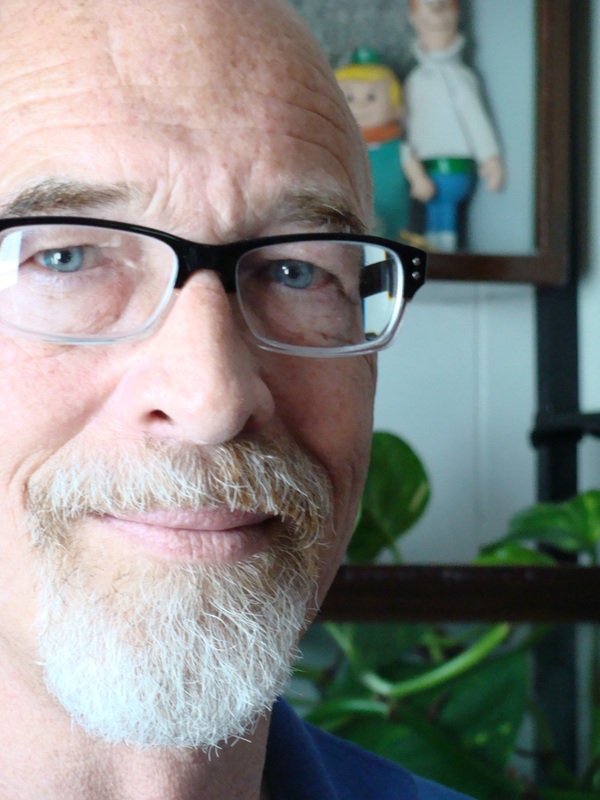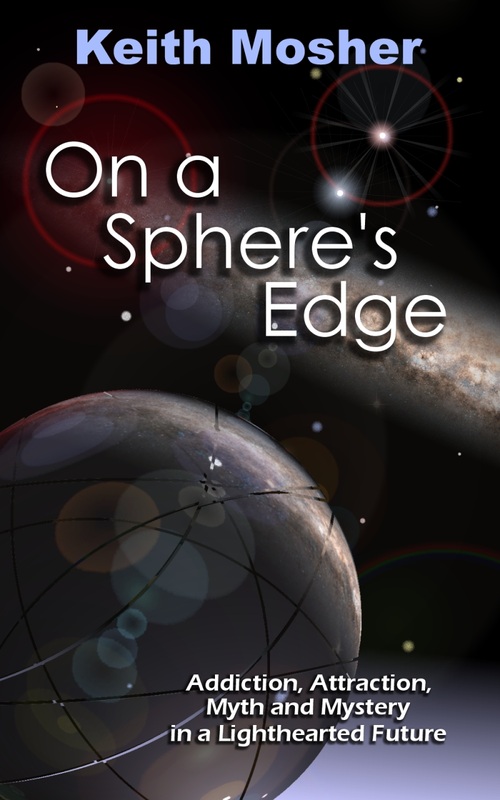I am a published article author, though I admit that was decades ago. I have a Bachelor of Media Arts degree from the University of South Carolina (also decades ago). I have been an Audio Producer / Engineer, a Law Office Manager, and I currently am a Martial Arts Instructor.
My first novel is On a Sphere's Edge, a sci-fi adventure / mystery. I currently work on promoting it, while working on my coming novel, The Curmudgeon Code.
Tell us about your latest book.
My currently available work is titled, On a Sphere’s Edge.
It is the 24th century. Humanity has spread out among the stars thanks to a 22nd century power system.
Lieutenant Commander Alexandria Novastra needs to determine if the legends about a powerful device that is supposed to guide humanity and civilization are merely myth or based on some reality. Much to her surprise, she learns that the legends are based in truth. It is only then she learns that the device is addictive. She realizes that she cannot turn this device over to her commanders. Military minds and all consuming, potentially destructive powers do not make a good match. She reluctantly accepts that she needs to drop out of the system to protect the device and humanity, and to do that she enlists the aid of a crafty ex-con.
Slated for late 2015, I have The Curmudgeon Code.
Tag Line: Our future draws upon our past.
Technology holds great promise and great risk. What we ask computers to do today may be the force that controls us tomorrow.
Joshua has grown up in what many would call utopia. There is no war, no hunger, and no disease. There can even be no death if one wishes, all due to amazing technology. However, is it really the Promised Land? The future does not have to be dystopian for it to have great difficulties. Evolution never rests.
What genre do you enjoy writing the most and why?
I prefer to write science fiction. Science fiction often has positive effects on humanity. From Jules Vern and H.G. Wells, to Clarke, Asimov, and beyond, there have been shining lights that you do not find in many other forms of writing. I do not disregard the Angelous, Morrisons, and Ghandis of the writing world. Every form of writing has its bright marks and values. However, for me science fiction offers the possibility of hope and change, as opposed to retelling the woes of what has been, or the drama of everyday life, or playing on the fantasies of the impossible.
From where do you draw your inspiration?
I find inspiration in everyday life. My first novel, On a Sphere’s Edge, grew out of a round-robin story that I started on my Bulletin Board System (that was an electronic message board before the days of the Internet). Out of a tiny shred of that story, the story arch formed in my mind, based on the age-old game of “broken telephone,” a game where you whisper something into one person’s ear, and they into another ear, until, in the end, you see how the original message became broken.
The book I am writing now, The Curmudgeon Code, grows out of the realization that the Technological Singularity is inevitable, but what it will yield must be based on the things we build and create today.
Do you ever base your characters on real people in your life?
I frequently base my characters on real people in my life. I often use some unique variants of their names; I may use their physiques, and at times use their mannerisms. Some characters are fully imagined. However, I do not believe you can really disconnect from the reality that surrounds you. You are always affected in some way.
What authors inspire your writing?
There is a wide range of inspirational authors: J.R.R. Tolkien, Plato (at least his writings on Socrates), Asimov, Douglas Adams, Douglas Hofstadter, and others.
What kind of books do you like to read?
I enjoy reading science, science fiction, and philosophy works.
How have your real life experiences influenced your writing?
Our real life experiences unquestionably affect and effect the way we write. What we write, how we write, and why we write. I enjoy writing my blog, which is nothing but real life stories and events. Nonetheless, when writing fictional works, such as my novels, my real experiences play some role, either in helping to craft small everyday events of character or in dialog, or in the overall message.
What do you like to do when you are not writing?
I must admit, I am a hermit of sorts. I write during the day and teach martial arts classes in the evening. I enjoy going to the movies, and do so often. I enjoy swimming in the summer. But, if I am not doing any of those things, I am either reading or writing.
What was your road to publishing like? Tell us about it.
On a Sphere’s Edge went for a very long ride. The writing of the story began in the 1980’s. It was put to bed for a while. In the 1990’s I picked it back up, not sure what I would do with it, I just knew I had to write it. Again, it went to bed. I picked it up again in late 2010. I felt driven to complete it. Originally, the structure was a rather basic A-B-A-B, protagonist, antagonist, back and forth. I changed it to be almost solely protagonist. What we do not see can be a little more unnerving.
Regardless, when I felt it was complete, I began the quest for publication, following an old-world approach. I submitted to several publishers and received the customary, “We are not looking for something like this right now” notices. Already having my second novel brewing in my mind, I elected to give self-publishing / independent publishing a try. I felt that my first novel would be a good learning ground for the greater works that I knew would follow.
Overall, I have found self-publishing as daunting as old-world publishing. Yes, you can get your work published in a flash. Getting it out in the hands of the public, getting it reviewed and seen, that becomes the author’s responsibility. Something they may not be well adapted to. However, I am pleased enough with the process, and I keep plugging away at it.
How did you come up with the title of your book?
The title, On a Sphere’s Edge, was a flash of insight. There is a primary spherical device in the story. This sphere is steeped in legend, which holds a certain edge over some of the populations. Part of the title refers to that edge – that leverage. Part of the title is an odd look at the idea of a sphere having an edge. Does a sphere have an edge? (This one does.) Interestingly enough, one can also glean out of the title the idea of living on a globe’s surface – on a sphere’s edge. It all plays together so well.
Is your book a stand-alone or a series?
On a Sphere’s Edge is a stand-alone story. At least, it was written that way, but I have had a request to consider a sequel, and have mapped one out.
The coming work, The Curmudgeon Code is also a stand-alone, though I have left open the possibility of a follow up.
Do you read the genre you write for or do you prefer other genres?
I enjoy reading science fiction, and do so regularly, but I also read other genres.
What is the hardest part of the writing process for you?
The hardest part of writing is controlling the use of passive voice, and playing with tense.
What is the easiest part of the writing process for you?
The easiest part of writing is the typing. If any other part of the writing is easy, you are not trying hard enough.
Which of your characters is your favorite and why?
My favorite character in On a Sphere’s Edge is Zeal Katz, one of the main characters, though I do have a fun fondness for a minor character, Evon Brad. I have a very personal emotional attachment to a minor character, Eliza Beth.
Who or what are your inspirations/influences?
My inspirations are the problems and hopes that humanity faces.
What is your preferred writing environment?
My living room is my writing haven.
How would you describe your writing style?
My writing style varies. On a Sphere’s Edge attempts at times to have some action. However, I tend to present an omniscient view, often laden with passive voice (something I keep trying to reduce).
Do you have a careful plan when plotting your stories or do you just go with the flow?
I do not write story outlines, though I do write notes. I do not write without a plan, but I find if I try to pre-fix the plan, such as writing an outline, I try to force characters and events toward the outline. As such, I keep notes, while keeping the plan fluid in my thoughts. For me, doing it in this way, I seem to be more in touch with the inner light that formulated the plan in the first place. My characters and events seem to flow in that direction, at times in ways I could not have foreseen. That fluid quality allows me to put more life in my characters, sometimes letting them dictate how events unfold, while keeping the goal on target.
With many publishing routes available today, which felt the most reliable to you when it came to the many choices?
Clearly self-publishing feels the most reliable if the desire is to have a work published. Having your work read, reviewed, and received, requires something more. What is the most reliable route? Who can really say?
When did you know you truly wanted to give writing a shot?
When I was in my early teens, a favored aunt passed away. I wrote a letter of condolence to my uncle, who was a very learned man. At his passing I was told that he held that letter, above all the letters he had received over his entire life, with highest reverence. It was in his pocket, years old and worn, on the day he passed. He had told individuals near him how astounded he was at what I had written. That sparked a small coal. But life is life and presents many interruptions. Years later, I created my Bulletin Board System, which required some writing. That led to the On a Sphere’s Edge story, which rose and fell over decades. In the middle of that, I wrote an article for a magazine, which was not only published, I was paid for it. I knew I could write.


 RSS Feed
RSS Feed
